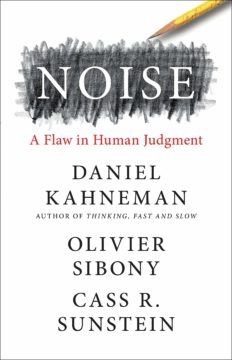Tim Adams in The Guardian:
 Could you define what you mean by “noise” in the book, in layman’s terms – how does it differ from things like subjectivity or error?
Could you define what you mean by “noise” in the book, in layman’s terms – how does it differ from things like subjectivity or error?
Our main subject is really system noise. System noise is not a phenomenon within the individual, it’s a phenomenon within an organisation or within a system that is supposed to come to decisions that are uniform. It’s really a very different thing from subjectivity or bias. You have to look statistically at a great number of cases. And then you see noise.
Some of the examples you describe – the extraordinary variance seen in sentencing for the same crimes (even influenced by such external matters as the weather, or the weekend football results), say, or the massive discrepancies in insurance underwriting or medical diagnosis or job interviews based on the same baseline information – are shocking. The driver of that noise often seems to lie with the protected status of the “experts” doing the choosing. No judge, I imagine, wants to acknowledge that an algorithm would be fairer at delivering justice?
The judicial system, I think, is special in a way, because it’s some “wise” person who is deciding. You have a lot of noise in medicine, but in medicine, there is an objective criterion of truth.
More here.
